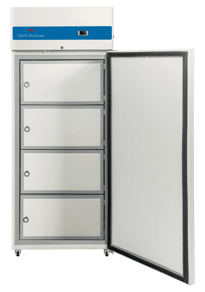Compact Medical Grade Refrigerators: A Guide

Medical-grade refrigerators are indispensable in the world of modern medicine since they play a critical role in safekeeping biological samples, vaccines, medicines, and other medical supplies.
Lab refrigerators come in a variety of sizes and styles, including built-in, countertop, and under the counter. Compact laboratory refrigerators are ideal for small and large facilities, including hospitals, surgery centers, research facilities, or even crime labs that may not have space for a full-sized refrigerator.
Features
Despite their size, compact lab refrigerators are heavy-duty and offer a wide-range of distinguishing features, including:
- Precise temperature control. Medical grade refrigerators available at North Sciences maintain strict temperatures via the implementation of digital thermostats and digital data logger devices
- Microprocessors that control equipment mechanisms
- The forced-air circulation that maintains the storage unit at uniform temperatures and offers quick recovery after door openings
- Designed with specific dimensions that allow them to be easily installed and plugged in compact areas
- Rechargeable battery‐back‐up system
- Audible and visual alarms for out-of-range temperature values
- Heavy‐duty lockable and adjustable casters
Usage of Medical Grade Refrigerators
Medical grade refrigerators allow professionals to strictly adhere to proper storage standards in order to keep medical supplies in optimal condition.
Let’s talk about some specific uses of compact lab refrigerators:
- Storing medicines and drugs, like insulin, at constant internal temperatures. Studies show that improper storage can breakdown insulin, affecting its ability to effectively control blood sugar levels. They need to be stored at a stable temperature of 39° F (or 4° C).
- Storage of vaccines according to CDC guidelines. Medical grade refrigerators offer temperature range control between 0–10°C, and the refrigerated vaccines must be stored between 2 to 8°C at a setpoint of 5°C.
- Preservation of blood samples, plasma, and other temperature-sensitive compounds. A blood bank may use lab refrigerators to preserve the quality of the blood supply.
- Storage of medical or pharmaceutical supplies or monitoring the growth of certain bacteria.

Advantages of Compact Medical Refrigerator
- They’re equipped with temperature monitoring mechanisms that give warnings if the cold storage unit becomes too hot or cold, preventing the supplies from going to waste.
- They’re equipped with locking mechanisms that prevent access by non-authorized personnel. This is especially important when storing high-value medical items.
- Features like open-door alarms make medical refrigerators better suited for storing sensitive medical supplies
If you’re looking for medical-grade refrigerators for your facility, look no further! North Sciences offers a full range of temperature-controlled refrigeration and ULT freezer equipment that are designed to meet the needs of various sectors, including clinical research, pharmaceutical units, and healthcare centers.
What’s more, our biopharmaceutical VR Series refrigerator offers 3 different configurations for blood banks, vaccines and pharmaceuticals.
Get in touch with our team for more information.


